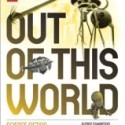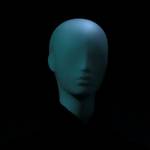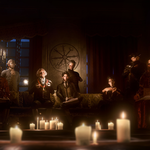Out of This World (Science Fiction: but not as you know it) puts together many of the most ground-breaking examples of science fiction literature that have seen print (and even a few that were never published), and for an exhibition consisting almost entirely of books its impact is commendable.
The interpretation team at the British Library have always been adept at making books fascinating, providing some great historical and ideological context around them, but they have really excelled with this latest exhibition that explores the history of science fiction and its visionary themes.
Of course, science fiction and futurist thinking go hand-in-hand and until recently you could have argued that they were one and the same. It is this aspect that the exhibition focused on, and did so very well, in that it was for the most part showing how it has been through science fiction that we have dealt with pressing ethical and technological issues even before they become reality. In many instances, it is the works themselves that bring about the eventual invention in a kind of self-fulfilling prophesy.
Amongst the many fantastically looked after tomes – including a couple of Philip K Dick first editions, which made this author particularly happy – were numerous examples of humanity’s capacity to foresee and attempt to deal with problems both pressing and far off into the future. In fact, there was a distinct focus in the exhibition in drawing in many early texts to show that even though we consider science fiction to be a relatively new genre of literature; its roots actually lie in authors exploring issues of social cohesion and political possibilities (Thomas Moore’s Utopia being a particular highlight that lends its namesake to an entire field of futurist thinking).
The exhibition was a good illustration of categorical thinking in interpretation – so instead of taking us on a chronological journey through science fiction it explored instead the different forms that thinking within the genre have taken. Everything from our desire to journey to the stars, fear of alien invaders, visions of future dystopias, paranoid landscapes of urban modernity, artificial intelligence, virtual reality and many other sub-genres were represented. If anything, it was a fantastic overview of just how broad a genre science fiction really is; exploring every aspect of the human condition from warfare to romance, isolation to communal expression.
It was a great example of how exhibitions can be constructed that go beyond objects and extend out to present a tapestry of ideas. A book is a book is a book (well, except maybe the special edition of Flatland on display), but every single one of them contained a different universe of possibility that enticed you to contemplate further the realities they were presenting. Many of the older books, of course, had magnificent prints and imagery to accompany the text; and seeing depictions of future technology throughout the ages, and how much it differs and yet is the same, was a true highlight of the exhibition. Even just going through and reading short summaries of the plots of books, many of which I had never even heard of, was enough to fill a futurist thinker with ideas for the rest of their natural life (and even more thoughts of what form an unnatural life might take).
Around this were a number of videos, as well as some great interactive elements that show modern exhibition design at its best. Kids of all ages were invited to draw their visions of aliens into a computer, which were then to be seen projected en masse up on a big screen in all their technicolor glory (presumably moderated to weed out penis monsters). There were some fantastic, mood setting sculptures around the place; but my favourite had to be the Turing Test demonstration where you could interact with an A.I. in an attempt to recreate the complexities of human conversation. The older man at the terminal next to me had a lengthy conversation about the difference between being and speaking English, something which he was determined to get the computer to understand to amusing effect.
Wonderful stuff, and a real treat to see futurist thought presented in such a mainstream context, but unfortunately the exhibition has now ended (I know, what a tease of a post right?!). Thankfully, an absolutely magnificent book was produced to go alongside the exhibition. It’s a true labour of love and any science fiction fan will want to get their hands on a copy (if you buy through the link to the left you support Future Conscience along the way!).
If this is a sign of future exhibitions at the British Library then I can’t wait, as it was an almost perfect example of how modern exhibition interpretation can combine with a subject holding infinite imagination to truly inspire those who visit towards a deeper understanding of themselves and the universe around them.





